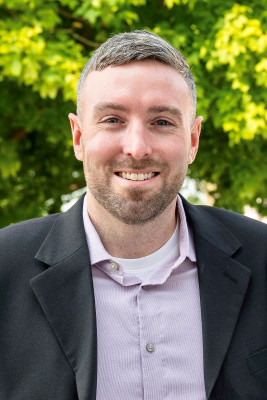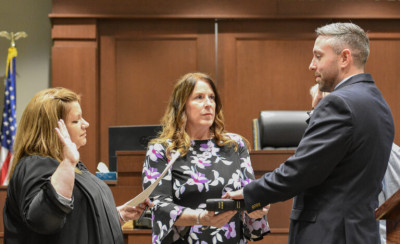
Voices Across ACOI: Zachary West, DO, FACOI
by ACOI
June 9, 2025
Where Service and Leadership Create Powerful Engagement
An osteopathic physician’s path from primary care provider to County Coroner
 Physicians commit to a career fueled by serving others. What does it mean to integrate that experience into public service? Over the past several months, Zachary West, DO, FACOI, has been finding out for himself. An osteopathic internal medicine physician and longtime ACOI member, Dr. West had the unique achievement of, in 2024, being elected to the office of coroner in Seneca County, Ohio. Dr. West was already accustomed to serving his community as the owner of a local direct primary care practice; he considered this simply a new way to continue doing the same.
Physicians commit to a career fueled by serving others. What does it mean to integrate that experience into public service? Over the past several months, Zachary West, DO, FACOI, has been finding out for himself. An osteopathic internal medicine physician and longtime ACOI member, Dr. West had the unique achievement of, in 2024, being elected to the office of coroner in Seneca County, Ohio. Dr. West was already accustomed to serving his community as the owner of a local direct primary care practice; he considered this simply a new way to continue doing the same.
That commitment is both intrinsically motivated and inspired by his connections to the people around him. “A physician in a small town in a rural part of the state will inevitably be asked to serve the community in different capacities,” Dr. West said, when asked about what drew him to this elected office. Beyond that, he added, “I think it’s important for physicians to be engaged. For many of us, this is the way we give back.”
Dr. West was also recently named chair of the Osteopathic Integration Task Force. This ACOI committee works to foster osteopathic principles and practices in the internal medicine field, with a focus on presenting at the ACOI Annual Convention. Dr. West became part of ACOI during medical school, and as a student member, he regularly attended ACOI educational events and meetings, which inspired him to join the committee. For the past two years, being part of the Task Force has allowed him the opportunity to present and teach at the Annual Convention, adding another form of leadership to his scope of experience.
Building a Foundation for Focused Expertise
Dr. West’s chosen areas of involvement reflect a multifaceted career. He started on his path into medicine relatively early: during his last two years of high school, he participated in the Ohio Post-Secondary Enrollment Options Program to add college credits to his courseload. He graduated with two associate degrees, in pre-allied health and in natural and biological sciences. Afterward, Dr. West completed a Bachelor of Science in biology at Youngstown State University, then pursued a Master of Public Health to obtain broader background knowledge before applying to medical school.
While finishing his Master's, Dr. West was accepted to Ohio University Heritage College of Osteopathic Medicine in Athens, Ohio. Once he reached his third year, he realized during his rotations that internal medicine’s more comprehensive nature was the right fit for him. That led to an internal medicine residency at Fairfield Medical Center in Lancaster, where Dr. West became Chief Resident during his last year. He then practiced for a year before deciding to go back into a fellowship. That fellowship, offered through a program at Northern Light Eastern Maine Medical Center in Bangor, Maine, was in Osteopathic Neuromusculoskeletal Medicine (ONMM).
Part of what drew Dr. West to osteopathic medicine was the chance to practice osteopathic manipulative medicine (OMM). He took independent courses to train in it after medical school, but encountered few opportunities to implement it professionally. The fellowship, essentially a one-year immersion in ONMM, was a natural next step. Now, he said, “It’s very much incorporated into what I do in my practice.”
A Unique Form of Local Leadership
Dr. West started that practice, the Ohio Institute of Osteopathic Medicine, after the year he spent in a corporate healthcare setting post-medical school. That experience showed him that his work had taken a form misaligned with his preferences and values. “At that point,” he said, “I’d committed so many years to this profession – I had to find a different way to provide the care I wanted to provide. That left going private."
Direct primary care has proven to be a great fit. “I ended up finding a path that allowed me to utilize all the skills that I had attained from medical school, through residency, through my fellowship, and to be able to take those directly to a patient,” he said. It has its challenges – the kind that come with running a small business – but, he added, "That tradeoff fits me very well, and I am much happier being independent and working in that model.”
This position of leadership and expertise also fits well with being on the Seneca County Board of Health – which, in turn, ultimately led to serving as County Coroner.

Dr. West being sworn in as County Coroner.
Dr. West joined the Seneca County Board of Health in 2022. “Because a health district is required to have at least one physician,” he said, “I was able to play that role, and draw upon my background to advocate for different public health policies.” Being elected as the Board’s Vice President in 2023 and 2024 piqued his interest in running for office at some point. That point arrived with a primary for the office of County Coroner against a 19-year incumbent. Dr. West decided to put his name in the running.
“In Ohio,” he explained, “there’s a coroner designated by each county, and it’s required to be a physician. They make it a required elected position, so you’re accountable to the people you serve.” (Note: This is not always the case – in some states, coroners are appointed, and they are not always required to have a medical background.) “When the opportunity came to run, it was not something I’d imagined [before], that I might serve in that capacity. But I enjoy a challenge, and this was a chance to serve my community.” It was the first time Dr. West had ever run in a campaign, and in November 2024, he won.
Even before officially taking office in January 2025, he started bringing Seneca County up to speed, in terms of “the minimum legal standards for medicolegal death examinations – how they are conducted, reported, completed,” as he put it.
“When I say, ‘getting up to minimum standards,’ some of these things are basic,” Dr. West said. Those seemingly simple improvements – which have turned out to be majorly beneficial – included establishing a dedicated public office, setting up email and phone communication, and, perhaps most significantly, making the Coroner’s Office files publicly available. They are required to be public records, but the previous coroner’s unorthodox filing system made them inaccessible for anyone’s review. Dr. West had the files transferred to the new office and catalogued chronologically.
Another significant update was hiring trained case investigators - professionals who are dispatched to coroner scenes, interact with law enforcement and first responders, and investigate cases. “We’re in this flux period where people with four-year degrees and Master’s degrees in forensics are filling this field,” Dr. West said. Meanwhile, “There are folks like retired law enforcement or nurses who get trained to work as case investigators. I was able to bring in interim case investigators from a neighboring county that had gone through this transition as well, to help with coverage. Our county then brought in two new hires. So we are now in this period where the seasoned case investigators can help train the new hires, so that ultimately Seneca County will have its own dedicated case investigators.”
This has had the secondary benefit of creating professionals trained across counties, which, Dr. West said, "becomes important in any incidents where a neighboring county needs assistance or a mass casualty event. You would have those individuals who trained together able to be dispatched and provide aid.” Focusing on the collective who makes investigations possible has been key to Dr. West’s approach. He’s prioritized collaborating with law enforcement, first responders, and other groups to create more cohesion in medicolegal death cases.
“We organized a joint training session in my first few months,” he said, that allowed these groups to work on basic medicolegal death scene investigation protocol. “It was the first time our county had ever done so. We actually had three different County Coroner’s offices as part of it. It was really well-attended, and I was happy to help orchestrate and offer that.”
Advocacy and Action Inspired by Experience
These productive months have demonstrated to Dr. West how a medical background is an excellent foundation not just for service and leadership, but also for governance and decision-making. “Physicians by and large care about people’s well-being,” he said. “We can do a lot of critical thinking, analyze things – on most days, we have to take data, process it, and come up with solutions. Having that perspective as a public official is important. Not to dismiss any other perspectives – when you have a Board, for example, everyone’s is valuable. [But] physicians bring a unique perspective and can advocate for their patients and the people in their community. I think it’s important to have people like that at the table.”
Another piece of what makes his advocacy effective is being in a place with personal resonance. “I’m from Seneca County,” he said. “My private practice is in Tiffin, the county seat. I grew up just north of Tiffin in a small rural farming community. When I set off to medical school, I always intended to make my way back to where home was.” When going into private practice, he wanted to offer that service in his hometown as well.
Having a personal investment has a tangible impact in general when it comes to service and advocacy. With physicians, the influence is all the greater: being able to address issues based on their experiences and their patients’ needs gives extra weight to their involvement. Dr. West is emphatic about how much this matters – especially now, as the healthcare field evolves and changes.
“A lot of things impact patient care and the practice of medicine,” he said. “Unless physicians are willing to be engaged, then we’ll end up having a lot of things transpire that none of us will like.” But, he added, if physicians step up and use their experience to advocate for the profession, there’s so much that can change for the better. "You have to be engaged, you have to be present – if you can, fill that role.”

